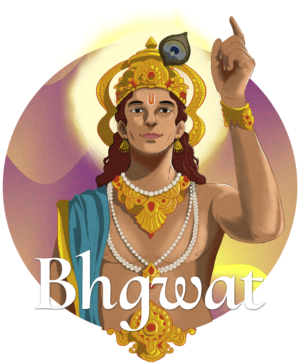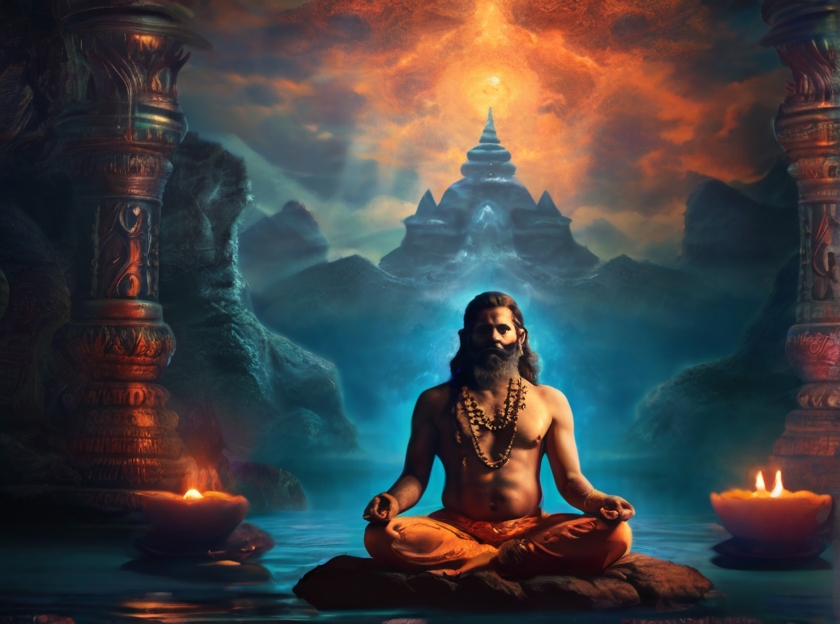Understanding Divinity in Hinduism: Bhagwan, Prabhu, Ishwar, Parmatma, and Devta
Hinduism, one of the oldest and most diverse religious traditions in the world, encompasses a rich tapestry of beliefs, practices, and deities. Central to its theological framework are various terms that denote different aspects and forms of the divine. Among these, Bhagwan, Prabhu, Ishwar, Parmatma, and Devta stand out as key concepts, each carrying unique meanings and connotations. These terms, while often used interchangeably, reflect different dimensions of divinity—from the supreme and all-powerful to the specific and functional. This article delves into the intricate distinctions and profound significance of these terms as elucidated in the Hindu Puranas and other sacred texts, offering a deeper understanding of the multifaceted nature of the divine in Hindu philosophy.
Bhagwan (भगवान्)
**Definition:** Bhagwan refers to the Supreme Being endowed with six opulences: wealth, power, fame, beauty, knowledge, and renunciation. This term is often used to denote a deity who possesses these qualities in their fullest measure. Bhagwan is frequently used to refer to Vishnu, Krishna, or Shiva, who are considered supreme in various traditions.
Scriptural Reference:
भगवान् ऊवाच:
भूताऽनां प्राणिनां देह एक एव तु गोपन: |
योऽन्त: प्रजासु पुरुष: स वै भगवान् उच्यते ||
— Srimad Bhagavatam 1.2.11
Explanation: This shloka from the Srimad Bhagavatam highlights that Bhagwan is the Supreme Being who resides within all living entities as their protector and sustainer. The term encapsulates the divine presence that oversees and nurtures all life forms.
Prabhu (प्रभु)
Definition: Prabhu means “Lord” or “Master,” denoting someone with authority, power, and control. It signifies respect and reverence towards a deity or an elder who holds a position of authority.
Scriptural Reference:
कृपया तव साहाय्यं च |
तस्मात् त्वं प्रभु रूपेण कृपणं मामुपेक्षय ||
— Bhagavad Gita 11.4
Explanation: In this verse, Arjuna addresses Krishna as Prabhu, acknowledging his supreme authority and seeking his guidance and support. The term Prabhu conveys Krishna’s role as the divine master who can lead Arjuna out of his despair.
Ishwar (ईश्वर)
Definition: Ishwar signifies the “Supreme Controller” or “God” who is the ultimate cause of creation, maintenance, and destruction of the universe. It is a term that emphasizes God’s sovereignty and omnipotence.
Scriptural Reference:
ईश्वर: सर्वभूतानां हृद्देशेऽर्जुन तिष्ठति |
भ्रामयन्सर्वभूतानि यन्त्रारूढानि मायया ||
— Bhagavad Gita 18.61
Explanation: This verse from the Bhagavad Gita states that Ishwar, or God, resides in the hearts of all beings and directs their actions through his divine will. Ishwar’s omnipresence and omniscience are highlighted here, showcasing his role as the supreme orchestrator of the cosmos.
Parmatma (परमात्मा)
Definition: Parmatma translates to “Supreme Soul” and refers to the ultimate, all-pervading spirit. It is often used in the Upanishadic context to denote the absolute reality or Brahman, which is beyond all dualities and distinctions.
Scriptural Reference:
द्वा सुपर्णा सयुजा सखाया समानं वृक्षं परिषस्वजाते |
तयोरन्यः पिप्पलं स्वाद्वत्त्यनश्नन्नन्यो अभिचाकशीति ||
— Mundaka Upanishad 3.1.1
Explanation: This famous verse from the Mundaka Upanishad describes two birds sitting on the same tree. One bird eats the sweet fruit, while the other simply watches. The two birds represent the individual soul (jivatma) and the Supreme Soul (Parmatma). The Parmatma is the silent witness to all actions, highlighting the difference between the transient experiences of the jivatma and the eternal nature of the Parmatma.
Devta (देवता)
Definition: Devta means “Deity” or “God” and refers to the various gods and goddesses who manage different aspects of the universe. These deities are considered manifestations of the one supreme reality, responsible for the natural and cosmic order.
Scriptural Reference:
देवानां यज्ञसिद्धिर्भवति नान्यथा भवेत् |
ते तु यज्ञैस्तथा चान्ये देवा: कार्यं प्रशस्यन्ते ||
— Rigveda 1.164.50
Explanation: This verse from the Rigveda emphasizes the importance of rituals (yajnas) in pleasing the deities (Devta). The deities, in turn, sustain the order of the universe through their divine functions. Each Devta has a specific role, such as Indra being the god of rain and Agni the god of fire, highlighting the interconnectedness and interdependence of all aspects of creation.
Comparative Analysis
– Bhagwan vs. Ishwar: While both terms refer to the supreme divinity, Bhagwan emphasizes the possession of divine opulences, whereas Ishwar focuses on the aspect of divine control and governance.
– Prabhu vs. Parmatma: Prabhu denotes a revered master or lord, often used in a more personal context, whereas Parmatma refers to the universal, all-pervading soul that is the ultimate reality.
– Devta vs. Bhagwan: Devtas are individual deities with specific functions within the cosmic order, whereas Bhagwan is the supreme deity encompassing all divine attributes.
These terms illustrate the rich and nuanced understanding of divinity in Hindu philosophy, reflecting different aspects of the divine and their interactions with the cosmos and human experience.



